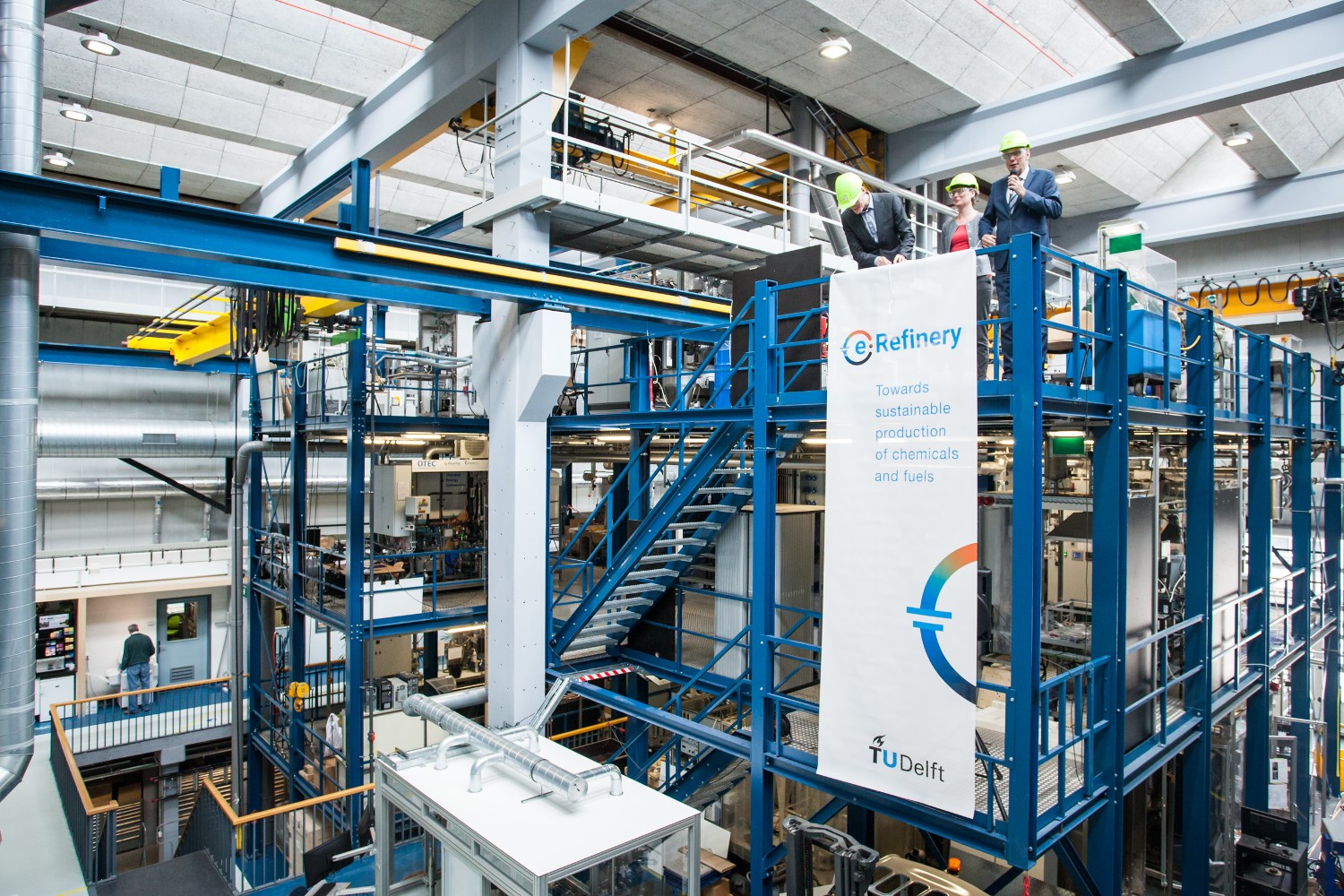As a PhD candidate whose research is partially funded by Shell, Hugo-Pieter Iglesias van Montfort has some questions and remarks for the End Fossil climate activists.
Deans Lucas van Vliet, Paulien Herder and Theun Baller perform the opening ceremony of the e-Refinery on 24 May 2018. (Photo: TU Delft)
English only
In recent days, a discussion has started germinating on whether TU Delft should sever ties with fossil-based industries and their involvement in funding research at our institution. Following a general trend previously seen across the US [1: to find the numbers and their links, scroll to the end of the page, Eds.] and, closer to home, the Free University of Amsterdam [2] and the Erasmus University in Rotterdam,[3] a group of students and staff at TU Delft has spoken up against investment from fossil-based companies the likes of Shell, BP and RWE.
The activist group makes the point that the involvement of the said companies in research compromises the independence of recipient scientists and universities and enables industry to ‘gatekeep’ and sabotage any changes to their business model. The group believes that the only reason that these companies are investing in research is to hoard technological advances, capturing research directions and block its application in industry. [4] This statement ignores the fact that not all research fields are created equally. While it is obvious that fossil-based enterprises should stay far from research on energy policies, it is not obvious that they should be kept far from advances in, say, new technologies that seek to replace fossil sources for base-chemicals and commodities.
Instead of blindly defunding research directions on idealistic grounds, we should ask ourselves how the influence these companies exert can best be controlled and the transparency of these resource streams improved. For example, one option might be to devise democratic systems at TU Delft that actively control and test the suitability of endowments and alignment to its guidelines. This would fully involve the community in decision-making, leaving no room for doubt as to external influencing of research directions.
We need to be honest in this matter: funding is important. It not only enables staff at TU Delft to perform research at the highest possible level, but it could, for example, also have an impact on equipment for general use and be used as a financing tool for underprivileged students. Additionally, it facilitates the publishing of research in open-access platforms by facilitating access to cutting-edge science in developing countries where resources for research are scarce. In this sense funding from industry is necessary to enable better science in the long run.
‘Public funding of renewable technologies is sluggish at best’
In the energy transition challenge that society is facing, technical solutions are as important as changes in policy and human lifestyle. These technological advances are, right now, in dire need of financial and political support. To those involved in the field of renewable technologies it is no secret that public financing has proven sluggish at best. Allowing private entities to join the scientific process allows us to target innovation towards solutions that matter. Excluding large-scale industrial emitters from this transaction would only limit their ability to implement meaningful solutions, thwarting any chance of achieving a sustainable economy.
In the end, all this boils down to two very simple questions for the protesters. One: what technology do they propose using to replace the production of one billion (yes, with a ‘b’!) tons of carbon-based chemicals per year by clean, greenhouse-gas neutral alternatives? Our society is bound by two constraints: providing quality of life for billions of people on this planet in a net-zero economy and ensuring as many people as possible are uplifted from extreme poverty. The production of these chemicals is unmistakably crucial to achieve both these objectives, as they are the cornerstone of fertilizers, pharmaceuticals and polymer production. Two: what organisations will execute this transition?
A keen-eyed reader will also discover an unsettling perspective in the protestors’ manifesto [5] and list of demands [6]. This group does not wish to establish a debate and be on speaking terms with the Executive Board and the scientific community at TU Delft – instead, it demands the immediate implementation of its proposals without public debate. It justifies this by stating that it has waited long enough after ‘talking with the board for months’ after which ‘nothing happened’ [7]. This kind of idealistic absolutism is a – well-dressed, I’ll give them that – form of authoritarianism that TU Delft should always condemn and reject.
 Hugo-Pieter Iglesias van Montfort. (Photo: private collection)
Hugo-Pieter Iglesias van Montfort. (Photo: private collection)Hugo-Pieter is a PhD candidate at the department of Chemical Engineering. His project, High current density system design for electrochemical CO2 reduction, focuses on scaling up electrolysers that convert CO2 and water into carbon-neutral fuels for industrial applications. His research is partially funded by Shell, in the context of TU Delft’s Towards Large-scale Electroconversion Systems project under the umbrella of the e-Refinery Institute.
References
[1] nytimes.com/2022/05/24/climate/fossil-fuel-divestment.html
[2] advalvas.vu.nl/nieuws/vu-stopt-samenwerking-met-fossiele-industrie-grotendeels
[4] instagram.com/p/CsBj7pJMV0W/
[5] docs.google.com/document/d/13auhsvETbyP4J217qpWESn6tGlq5n01nG-0o3gcr920/edit
[7] instagram.com/p/Cr5UsHqoAqB/
Opinion / Our platform is open to well written and well argued opinion articles written by students and employees of TU Delft. The maximum word count is 700. Email us at delta@tudelft.nl.



Comments are closed.